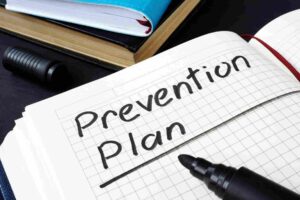Schizophrenia, a mental health disorder characterized by disruptions in thought processes, perceptions, and emotional responsiveness, is a condition that affects millions worldwide. There is growing evidence suggesting a significant correlation between schizophrenia and alcohol use. In this blog, we will delve into the intricate interplay between schizophrenia and alcohol, exploring its implications, challenges, and potential avenues for support and intervention.
Contents
How Schizophrenia And Alcohol Are Related?
 The relationship between schizophrenia and alcohol is complex and multifaceted, influenced by various biological, psychological, and social factors. While the exact nature of this relationship is still being studied, several key points highlight their interconnectedness:
The relationship between schizophrenia and alcohol is complex and multifaceted, influenced by various biological, psychological, and social factors. While the exact nature of this relationship is still being studied, several key points highlight their interconnectedness:
Shared Genetic Vulnerability
There is evidence to suggest that there may be a shared genetic vulnerability between schizophrenia and alcohol use disorders. Certain genetic factors or variations may predispose individuals to both conditions, increasing the likelihood of co-occurrence.
Neurobiological Mechanisms
Both conditions affect the brain’s neurotransmitter systems, including dopamine, serotonin, and glutamate. Dysregulation of these systems is implicated in the pathophysiology of schizophrenia and the rewarding effects of alcohol, suggesting potential overlap in neurobiological mechanisms.
Impact on Symptoms
Alcohol use can exacerbate symptoms of schizophrenia, such as hallucinations, delusions, and disorganized thinking. Conversely, the presence of schizophrenia may influence an individual’s response to alcohol, potentially altering their tolerance, sensitivity, and behavioral reactions.
Social and Environmental Factors
Social and environmental factors, such as stress, trauma, poverty, and peer influences, play a significant role in both schizophrenia and alcohol use. These factors can interact and amplify each other, contributing to the development and maintenance of both conditions.
Stigma and Social Isolation
Both schizophrenia and alcohol use disorders are associated with stigma and social isolation, which can further perpetuate the cycle of illness and substance misuse. Individuals may face discrimination, barriers to treatment, and reduced social support, exacerbating their vulnerability.
Understanding the interplay between schizophrenia and alcohol is crucial for developing effective prevention and treatment strategies.
What Should People With Schizophrenia Avoid?
Here are some specific things to avoid:
1. Alcohol and Recreational Drugs
Substance use, including alcohol and recreational drugs, can worsen symptoms of schizophrenia, interfere with medication effectiveness, and increase the risk of relapse. Individuals with schizophrenia should avoid alcohol and illicit drugs to maintain their mental health and treatment stability.
2. Stressful or Overwhelming Environments
High-stress situations, chaotic environments, or overwhelming stimuli can trigger or worsen symptoms of schizophrenia, such as hallucinations, paranoia, and disorganization. Individuals with schizophrenia need to prioritize their mental well-being by avoiding overly stressful or triggering situations when possible.
3. Isolation and Social Withdrawal
Social isolation can exacerbate symptoms of schizophrenia and contribute to feelings of loneliness, depression, and low self-esteem. While it’s essential to manage social interactions carefully and avoid situations that may be overwhelming, individuals with schizophrenia should aim to maintain supportive relationships and social connections to promote their mental health.
4. Non-Prescribed Medications
Individuals with schizophrenia must follow their prescribed treatment plan and avoid taking non-prescribed medications or supplements without consulting their healthcare provider. Certain medications and supplements may interact negatively with antipsychotic medications or exacerbate symptoms of schizophrenia.
5. Unhealthy Lifestyle Habits
Poor diet, lack of exercise, inadequate sleep, and smoking can negatively impact physical health and exacerbate symptoms of schizophrenia. Individuals with schizophrenia should prioritize a healthy lifestyle, including regular exercise, balanced nutrition, sufficient sleep, and smoking cessation if applicable, to support their overall well-being.
6. Negative or Triggering Media
Exposure to negative or triggering media content, such as violent movies, news stories, or online forums, can increase feelings of paranoia, anxiety, or distress in individuals with schizophrenia. It’s important to be mindful of media consumption and avoid content that may exacerbate symptoms or trigger negative emotions.
7. Abrupt Changes to Routine or Medication
Abrupt changes to daily routines or medication regimens can destabilize symptoms and increase the risk of relapse in individuals with schizophrenia. It’s essential to adhere to prescribed treatment plans and communicate openly with healthcare providers about any concerns or changes.
By avoiding these potential triggers and prioritizing self-care, individuals with schizophrenia can better manage their symptoms, reduce the risk of relapse, and improve their overall quality of life.
What Are The Risks Of Schizophrenia And Alcohol?
 The following are some common risks associated with schizophrenia and alcohol include:
The following are some common risks associated with schizophrenia and alcohol include:
- Increased Vulnerability to Harm
Individuals with schizophrenia may be more vulnerable to the harmful effects of alcohol. This increased vulnerability can lead to accidents, injuries, or victimization when alcohol is consumed.
- Compromised Medication Adherence
Alcohol use can interfere with medication adherence in individuals with schizophrenia, leading to inconsistent or inadequate treatment. This can result in symptom exacerbation, increased hospitalizations, and poorer long-term outcomes.
- Impaired Decision-Making Abilities
Both schizophrenia and alcohol use can impair decision-making abilities. Hence, leading to risky behaviors such as substance misuse, unsafe sexual practices, or involvement in criminal activities.
- Exacerbation of Physical Health Issues
Alcohol use can exacerbate physical health issues commonly experienced by individuals with schizophrenia, such as cardiovascular problems, liver disease, metabolic disorders, and compromised immune function. These health complications can further diminish overall well-being and increase mortality risk.
- Legal and Social Consequences
Alcohol-related behaviors, such as aggression, public intoxication, or impaired driving, can lead to legal consequences for individuals with schizophrenia. In addition to legal repercussions, alcohol-related incidents can also strain relationships, disrupt social support networks, and contribute to social stigma and discrimination.
- Financial Strain
Excessive alcohol use can lead to financial strain for individuals with schizophrenia, as it may result in spending money on alcohol rather than essential needs such as housing, food, or healthcare.
- Dual Diagnosis Challenges
Co-occurring schizophrenia and alcohol use present unique challenges for diagnosis, treatment, and recovery. Healthcare providers may face difficulties in accurately assessing and addressing both conditions simultaneously.
- Impact on Family and Caregivers
Alcohol use in individuals with schizophrenia can have a significant impact on family members and caregivers who may struggle to cope with the challenges of supporting a loved one with a dual diagnosis. This can lead to increased stress, caregiver burden, and strained family relationships.
Addressing these risks requires a comprehensive approach that considers the individual’s unique needs, circumstances, and treatment goals.
How To Manage Both Schizophrenia And Alcohol Addiction?
Managing both schizophrenia and alcohol addiction requires a comprehensive and integrated approach.
Essential tips
Here are some strategies for managing dual diagnosis of schizophrenia and alcohol addiction:
Medication Management
Work closely with a psychiatrist or healthcare provider to manage medications for schizophrenia and alcohol addiction. Medications such as antipsychotics, antidepressants, and medications for alcohol withdrawal or cravings may be prescribed to help stabilize symptoms and support recovery.
Psychotherapy
Engage in psychotherapy, such as cognitive-behavioral therapy (CBT), motivational interviewing, or dual diagnosis therapy, to address the underlying psychological factors contributing to both schizophrenia and alcohol addiction. Therapy can help individuals develop coping skills, identify triggers, and challenge maladaptive thoughts and behaviors.
Support Groups
Join support groups or peer-led recovery programs specifically for individuals with dual diagnoses of schizophrenia and alcohol addiction. These groups provide a supportive environment to share experiences, receive encouragement, and learn from others who are facing similar challenges.
Education and Awareness
Educate yourself and your loved ones about schizophrenia and alcohol addiction, including their symptoms, causes, and treatment options. Understanding the nature of both conditions can empower individuals to take an active role in their recovery and make informed decisions about their health.
Lifestyle Modifications
Adopt healthy lifestyle habits, including regular exercise, balanced nutrition, adequate sleep, and stress management techniques, to support overall well-being and reduce the risk of relapse. Avoiding triggers such as social situations where alcohol is present and practicing self-care can also promote recovery.
Family and Social Support
Build a strong support network of family members, friends, and peers who understand and support your recovery journey. Open communication, honest discussions about concerns, and involvement in family therapy or support groups can strengthen relationships and enhance coping skills.
Relapse Prevention Planning
 Develop a relapse prevention plan with the help of your treatment team, identifying triggers, warning signs, coping strategies, and emergency contacts to use in times of crisis. Regularly review and update your relapse prevention plan to stay proactive in managing both conditions.
Develop a relapse prevention plan with the help of your treatment team, identifying triggers, warning signs, coping strategies, and emergency contacts to use in times of crisis. Regularly review and update your relapse prevention plan to stay proactive in managing both conditions.
Managing both schizophrenia and alcohol addiction can be challenging, but with the right support, resources, and strategies in place, individuals can achieve stability, recovery, and improved quality of life. It’s essential to prioritize self-care, advocate for your needs, and stay committed to your recovery journey.
Conclusion
In conclusion, navigating the complex relationship between schizophrenia and alcohol requires a holistic approach that addresses the unique challenges posed by both conditions. From understanding the intertwined nature of genetic, neurobiological, and social factors to implementing treatment strategies, individuals with dual diagnoses can find hope and support in their recovery journey.
Therefore, with dedication, perseverance, and a supportive network, individuals can overcome these challenges, reclaim their lives, and move towards a brighter, healthier future.
